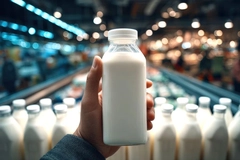MaterialsZone highlights AI-driven product development as the packaging industry’s future

The future of AI and machine learning in the packaging industry is heading toward an era where AI will actively guide product development and help companies adapt to evolving requirements, according to Ori Yudilevich, chief product officer at MaterialsZone.
MaterialsZone accelerates R&D by enabling companies to leverage their data, utilizing advanced data analysis and machine learning to model processes and significantly reduce iteration cycles.
We sit down with Yudilevich to discuss the cloud-based platform’s relevance for packaging and how it can help packagers optimize workflows. We also speak about the growing influence AI and machine learning will have on the packaging industry in the future.
How did MaterialsZone begin, and why was the company founded?
Yudilevich: MaterialsZone was founded by Dr. Assaf Anderson. Following a successful research project at Bar-Ilan University, Israel, on photovoltaic cells based on rust, in which machine learning and robotics were used to reduce the development time of a cell from years to months, Assaf was driven to bring this method to a broader audience. He believed a systematic approach to organizing data and using visualizations, insights and AI-driven product development could significantly accelerate R&D.
Ori Yudilevich, chief product officer at MaterialsZone.Assaf and his team took a leap, leaving the university to establish MaterialsZone as a company. Today, MaterialsZone helps organizations across different sectors leverage this approach to enhance their R&D processes.
Do you work with packaging companies, and if so, how do you help them?
Yudilevich: MaterialsZone considers the packaging sector a key industry segment. We help packaging companies and companies that provide raw materials to packaging companies (for example, masterbatches, compounds, paints and coatings) by optimizing formulations used in the packaging industry.
We consolidate and harmonize all R&D-related data across the organization — data that can be scattered across ERP systems, inventory databases, regulatory compliance tools, and spreadsheets — centralizing it on our platform to enable R&D teams to leverage it more effectively.
Once data is centralized and structured, our platform allows users to identify patterns and cause-effect relationships. Our machine learning and AI tools recommend materials, suggest formulations and predict properties, supporting researchers in making better product choices. This approach reduces the number of physical experiments needed and shortens testing duration, thus saving time and resources to develop sustainable, compliant, high-performing packaging solutions.
What can your services offer packaging companies and how do they differ from other industries?
Yudilevich: Our services offer packaging companies a streamlined, data-driven approach to R&D by centralizing data on a cloud-based platform, enabling better collaboration and faster innovation.
Packaging companies face unique challenges, such as adapting to new regulations (for example, on toxic materials) and meeting sustainability standards (for example, using more eco-friendly materials). MaterialsZone simplifies these processes by providing intuitive, no-code machine learning tools, empowering researchers to analyze data quickly and adapt formulations to evolving requirements, helping packaging businesses remain competitive in an increasingly dynamic and sustainability-focused market.
Where do you see the future of AI and machine learning for industries such as packaging headed and what are the main challenges?
Yudilevich: The future of AI and machine learning in industries like packaging is heading toward an era where AI will actively guide product development and help companies adapt to evolving requirements. AI can streamline compliance by managing complex information and keeping companies aligned with current standards. Generative AI will also play a crucial role, helping companies stay on top of new materials, technologies and best practices from the broader industry landscape, enabling faster and more innovative product development.
Another significant future development for packaging and other industries is the emergence of “self-driving labs,” where AI works alongside robotics to automate R&D experiments and data collection, which was MaterialsZone’s founder, Dr. Assaf Anderson’s initial vision. This approach reduces time and cost by enabling more efficient, large-scale testing and measurement, ultimately speeding up innovation and empowering researchers to boost efficiency and adapt quickly to changes.
One of the main challenges to overcome is change management. Many R&D teams are accustomed to traditional ways of working, and transitioning to data-driven, AI-supported methods requires a shift in mindset. MaterialsZone tackles this challenge by putting a strong emphasis on creating a platform that is user-friendly, intuitive and delivers immediate value, as well as educating teams on how AI can enhance their specific R&D processes, making the transition worthwhile and easier to embrace.











